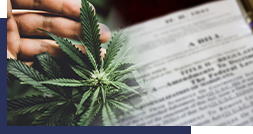Get A Quote
Congress Publishes First draft of Federal Cannabis Bill

US Congress has revealed a first draft of a potential law to decriminalize Cannabis. This bill, backed by Senate Majority Leader and co-sponsored by Senator Cory Booker shows that Congress is ready to make cannabis legal throughout the US.
“The War on Drugs has been a war on people—particularly people of color. The Cannabis Administration and Opportunity Act aims to end the decades of harm inflicted on communities of color by removing cannabis from the federal list of controlled substances and empowering states to implement their own cannabis laws,” the senators said in a summary of the bill that was shared with Marijuana Moment. “Descheduling cannabis is a critical step towards achieving justice for those targeted and hard hit by the War on Drugs. But that alone is not enough.”
The legislation contains many things that would clarify the problems that had come up without federal regulation including the following
- Decriminalization: Marijuana is under Tier 1 of the Controlled Substances Act, a tier that includes Heroin. The bill if passed would require the United States Attorney General to remove it within 60 days. However, this does not mean it would be legal in every state. This act allows states to determine if its legal or not. The act will allow interstate commerce, which is currently illegal.
- Regulation: The FDA would oversee cultivation and marketing of cannabis while the Tobacco Tax and Trade Bureau would be in charge of taxing Cannabis
- Social Equity: In an effort for social justice, the Act will ask to expunge nonviolent crimes involving Cannabis. This can be as simple as possession to cultivating the plants. It will also allow those facing sentencing to request a review of it,
- Consumer Rights: Under the bill, people who possess cannabis or having a conviction will no longer be denied federal benefits.
What this means if it passes is thar companies that work with Cannabis will be able to expand their business dealings beyond their state borders. If this does happen, it means that they would need different coverages for transport and cultivation. But until a federal regulation is passed, the state laws take precedent.

